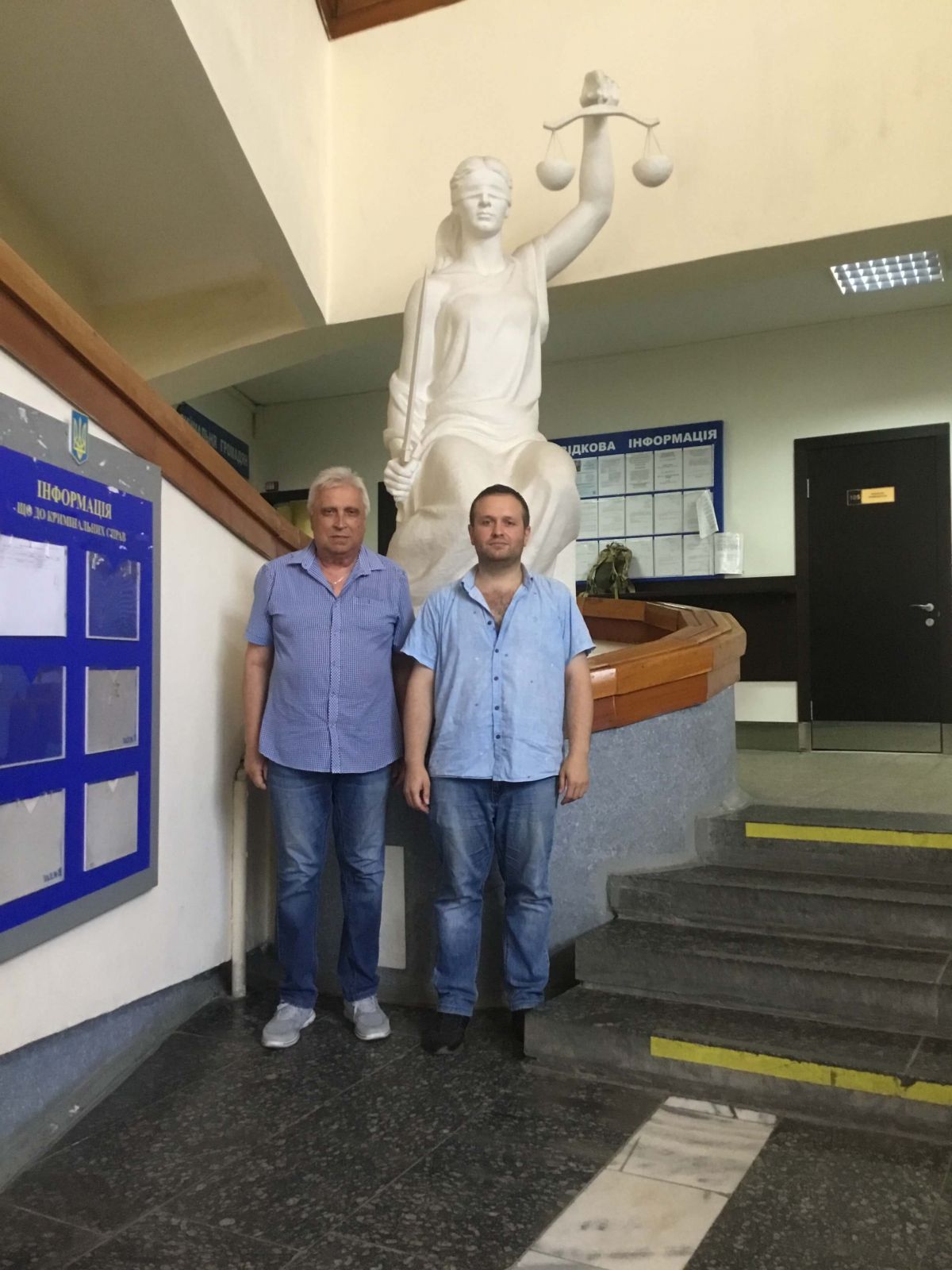On July 19, 2024, Eduard Abashia, a lecturer at the Department of Psychology at the Dnipro Institute of PJSC "IAPM", legal expert, psychologist at the Amur-Nizhnodniprovskyi district department of the State Institution "Probation Center" branch in Dnipropetrovsk region, and member of the International Association of Psychologists and Consultants on Sexual Education, held a working field meeting with lawyer and human rights activist Yuriy Skrypnyk. This meeting was dedicated to the topic: "Basic principles and standards for the treatment of convicts, prisoners, patients of special psychiatric care facilities who have committed socially dangerous acts."
Within the framework of the meeting, key points were raised and defined, namely:
- The state respects and protects the rights, freedoms, and legal interests of convicts, provides necessary conditions for their correction and resocialization, social and legal protection, and personal safety.
Convicts enjoy all human and civil rights provided by the Constitution of Ukraine, except for restrictions defined by the laws of Ukraine and established by court verdict.
The legal status of convicted foreigners and stateless persons is determined by the laws of Ukraine, as well as international treaties of Ukraine, the binding nature of which has been approved by the Verkhovna Rada of Ukraine.
The legal status of convicts is determined by the laws of Ukraine, based on the order and conditions of execution and serving of a specific type of punishment.
Discrimination against convicts on the grounds of race, skin color, political, religious and other beliefs, gender, ethnic and social origin, property status, place of residence, linguistic or other characteristics is prohibited.
The legal status of convicts transferred to Ukraine to serve their sentence, as well as convicts for whom a competent authority of a foreign state has made a decision on their extradition to Ukraine for criminal prosecution or execution of a sentence, is determined by the laws of Ukraine, taking into account the conditions of their detention defined by current international treaties, the binding nature of which has been approved by the Verkhovna Rada of Ukraine.
All prisoners are treated with respect because they have dignity and significance as human beings.
No discrimination is allowed on the grounds of race, skin color, gender, language, religion, political or other beliefs, national or social origin, property status, birth or any other characteristic.
It is also desirable to respect the religious beliefs and cultural traditions of the group to which the prisoners belong, in all cases, as required by local conditions.
Prisons are responsible for the detention of prisoners and the protection of society from offenses in accordance with other social tasks of any state and its main responsibilities in promoting the well-being and development of all members of society.
Except for those restrictions necessarily conditioned by the fact of imprisonment, all prisoners enjoy human rights and fundamental freedoms set out in the Universal Declaration of Human Rights (995_015), the International Covenant on Economic, Social and Cultural Rights (995_042), the International Covenant on Civil and Political Rights (995_043) and the Optional Protocol thereto (995_086) (Resolution 2200 A(XXI) of the General Assembly, Annex), as well as other rights set out in other United Nations covenants.
All prisoners have the right to participate in cultural and educational activities aimed at the comprehensive development of the human personality.
Conditions must be created that give prisoners the opportunity to engage in useful paid work, which will facilitate their reintegration into the labor market of their countries and oblige them to provide financial assistance to their families and relatives.
Prisoners enjoy medical care available in the country without discrimination due to their legal status.
With the participation and assistance of public and social institutions, with due regard to the interests of victims, favorable conditions are created for the reintegration of former prisoners into society in the most favorable conditions.
The above principles are applied without prejudice.
Probation subjects enjoy all human and civil rights provided by the Constitution of Ukraine, except for restrictions defined by the laws of Ukraine and established by court decision.
Probation subjects have the right to:
- participate in the preparation of a pre-trial report;
participate in the preparation of an individual work plan with the convicted person;
receive explanations of their rights and obligations;
receive information about the conditions of serving the sentence and the supervision by the probation body;
receive information about possible assistance and consultations;
participate in programs and activities organized by the probation body;
adhere to the legal regime of restricted access information;
appeal against decisions, actions or inaction of probation body personnel.
The authorized probation body within its powers ensures:
- Supervision of convicts released from serving their sentence on probation, pregnant women released from serving their sentence, and women with children under three years old;
Execution of punishment in the form of deprivation of the right to hold certain positions or engage in certain activities, community service and correctional work, probation supervision;
Implementation of probation programs for persons released from serving their sentence on probation, sentenced to punishment in the form of probation supervision;
Conducting social and educational work with convicts subject to probation;
Implementation of measures to prepare persons serving sentences in the form of restriction of liberty or imprisonment for a certain period for release;
Referring convicts to restriction of liberty to serve their sentence in correctional centers in the manner prescribed by Article 57 of this Code;
Implementation of other measures defined by legislation aimed at correcting convicts and preventing them from committing repeated criminal offenses;
Control over the fulfillment by convicts sentenced to probation supervision of the obligation to use electronic means of control and supervision for the period determined by the court.
Persons receiving psychiatric care have the rights and freedoms of citizens provided for by the Constitution of Ukraine and the laws of Ukraine. Restrictions on their rights and freedoms are allowed only in cases provided for by the Constitution of Ukraine, in accordance with the laws of Ukraine.
Persons receiving psychiatric care may take care of protecting their rights and freedoms personally or through their representatives in the manner prescribed by the Civil Code of Ukraine, the Civil Procedure Code of Ukraine and other laws of Ukraine.
During the discussion, it was also noted that among the most common violations and abuses committed by special institutions providing psychiatric care are:
- Violation of the terms of examination of patients by a commission of psychiatrists and submission of applications to territorial courts regarding termination, extension or change of application of compulsory medical measures;
Violation of patient detention periods;
Excessive and unjustified bureaucracy;
Rude and biased attitude towards visitors;
Creating obstacles for meetings with defendants (patients), delaying time, forcing visitors to wait for hours or even throughout the day at the checkpoint, etc.
Persons receiving psychiatric care have the right to:
- Respectful and humane treatment that excludes humiliation of human honor and dignity;
Receive information about their rights related to the provision of psychiatric care;
Receive psychiatric and social assistance, social services in conditions that meet the requirements of sanitary legislation, receive assistance from charitable and public organizations;
Refuse psychiatric care, except in cases of its provision in a compulsory manner provided by law;
All types of medical and sanitary assistance (including sanatorium treatment) according to medical indications;
Receive psychiatric care in the least restrictive conditions according to their mental state, if possible, at the place of residence of these persons, their family members, other relatives or legal representatives;
Stay in a psychiatric care facility only for the period necessary for examination and treatment;
Prior written consent or written refusal at any time from the use of new diagnostic and treatment methods and medicines or from participation in the educational process;
Safety of psychiatric care;
Free medical care in state and communal health care institutions, as well as free or preferential provision of medicines and medical devices in the manner prescribed by the Cabinet of Ministers of Ukraine;
Free legal assistance on issues related to the provision of psychiatric care;
Alternative, at their own request, psychiatric examination and involvement of any specialist participating in the provision of psychiatric care in the work of the commission of psychiatrists on issues of psychiatric care, with their consent;
Preservation of the right to housing at their place of permanent residence during the provision of inpatient psychiatric care;
Personal participation in court sessions, expression of their opinion on the conclusions of psychiatrists in court sessions when resolving issues related to the provision of psychiatric care and related restrictions on their rights;
Compensation for damage caused to them or their property as a result of illegal placement in a psychiatric care facility or social protection institution for persons suffering from mental disorders, or a special educational institution, or as a result of failure to ensure safe conditions for psychiatric care or disclosure of confidential information about mental health status and provision of psychiatric care;
Receiving remuneration for work actually performed on an equal basis with other citizens.
Persons during their stay in a psychiatric care facility or social protection institution for persons suffering from mental disorders have the right to:
- Communicate with other persons, including a lawyer or other legal representative, without the presence of third parties in accordance with the internal rules of the psychiatric care facility;
Notify any person of their choice about the provision of psychiatric care to them;
Ensure the secrecy of correspondence when sending and receiving any correspondence;
Access to media;
Leisure, engagement in creative activities;
Perform religious rites, observe religious canons;
Address issues related to the provision of psychiatric care directly to the head or department head of the psychiatric care facility, social protection institution for persons suffering from mental disorders, or educational institution for special education on issues of psychiatric care provision, social protection, social services, discharge from the psychiatric care facility, social protection institution for persons suffering from mental disorders, or educational institution for special education and observance of rights provided by this Law;
Receive assistance under compulsory state social insurance or pension in accordance with the legislation.
Regardless of the type of compulsory medical measures, the management of the special institution for providing psychiatric care ensures the realization of patients' rights provided for in Article 25 of the Law of Ukraine "On Psychiatric Care", as well as patients' rights to:
- Manage money, acquire, own and dispose of items, things, products, except those prohibited for use;
Make phone calls and use the global Internet network (at their own expense);
Receive and send parcels, packages, money transfers, receive deliveries;
Acquire, use and store essential items, periodicals, literature, food;
Manage free time according to the daily schedule;
Spend at least two hours outdoors daily;
Receive education in accordance with education legislation;
Use the services of a defender and other legal representative;
Have portable personal computers and accessories with them (for patients subject to compulsory medical measures in the form of hospitalization in a psychiatric institution with regular supervision).
Persons during their stay in a psychiatric care facility or social protection institution for persons suffering from mental disorders also have rights that, by decision of a psychiatrist (commission of psychiatrists) in the interests of protecting their health or safety, as well as in the interests of health or safety of other persons, may be restricted:
- Receive visitors in private;
Acquire and use everyday items;
Be alone.
The decision to restrict the rights of persons receiving psychiatric care is recorded in medical documentation indicating its duration and can be appealed to court.
It is prohibited to involve persons receiving psychiatric care in forced labor.
Special institution for providing psychiatric care (SIPPC) - an institution for providing psychiatric care where inpatient types of compulsory medical measures (CMM) provided for by the Criminal Code of Ukraine are applied.
CMM in the form of hospitalization in a psychiatric care institution with regular supervision - a type of CMM and psychiatric care where a person, while in the SIPPC, can independently, without the accompaniment of a medical worker, leave the ward, department, and SIPPC;
CMM in the form of hospitalization in a psychiatric care institution with enhanced supervision - a type of CMM and psychiatric care where a person, while in the SIPPC, can independently, without the accompaniment of a medical worker, leave the ward and department. Patients are prohibited from leaving the SIPPC independently without the accompaniment of a medical worker;
CMM in the form of hospitalization in a psychiatric care institution with strict supervision - a type of CMM and psychiatric care where a person, while in the SIPPC, can independently leave the ward but cannot leave the department independently without the accompaniment of a medical worker. Patients are prohibited from leaving the SIPPC, except for cases of participation in court hearings.
 Eng
Eng  Укр
Укр 

